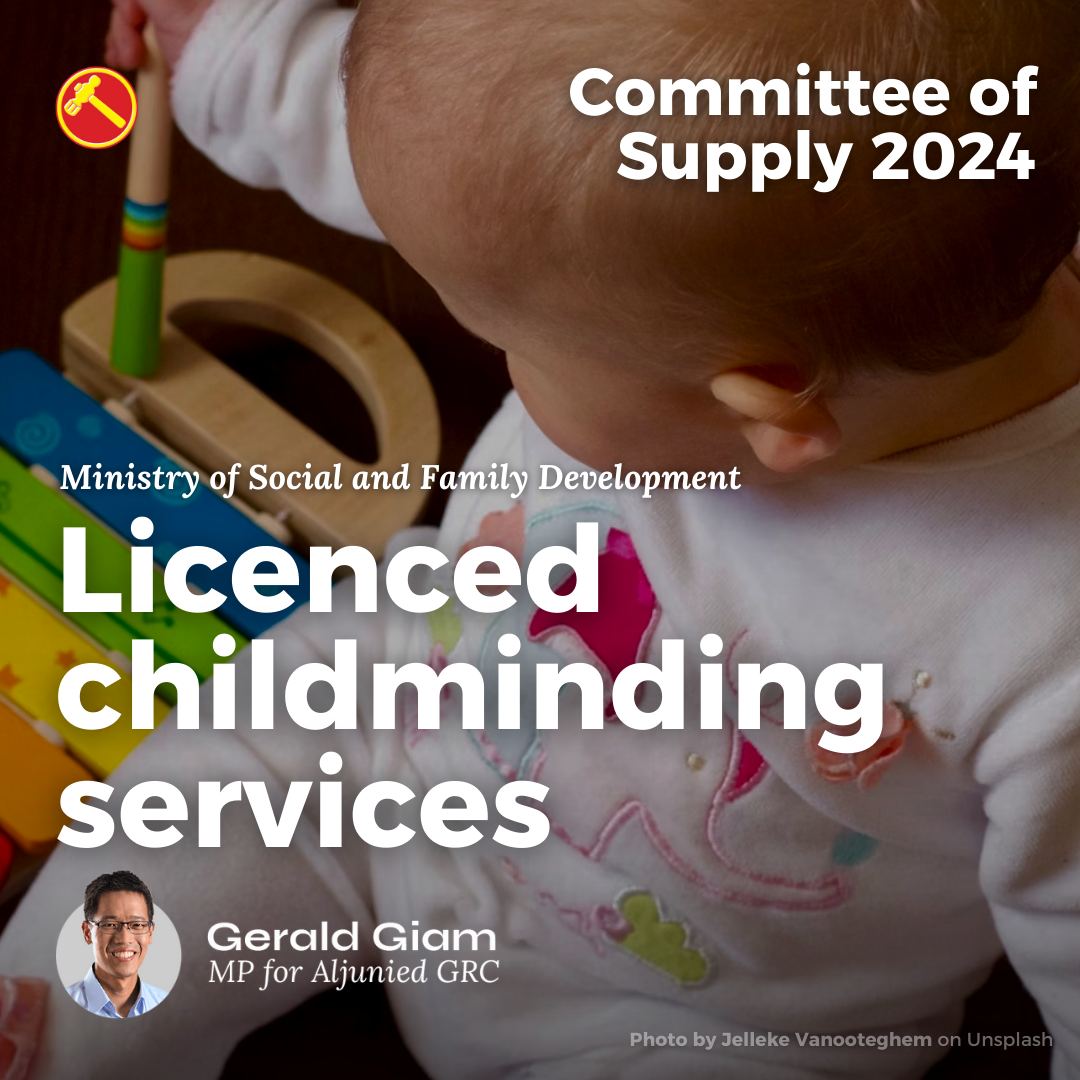Many parents are concerned about the safety of their young children after several high profile incidents at Kinderland preschool centres. On 18 September 2023 in Parliament, I asked the Minister for Social and Family Development whether the Early Childhood Development Agency will require all preschools to adopt a Child Protection Policy and provide a template to all preschools to customise it to their own needs. A Child Protection Policy will articulate the minimum standards laid out in government regulations and may also include additional safeguarding commitments that are tailored to the school’s unique circumstances.
I also highlighted that a Child Protection Policy not only protects children, but also teachers and schools from unwarranted accusations by students and parents, by setting clear boundaries for all parties in their interactions with each other.
In response, Minister of State (Social and Family Development) Sun Xueling held up three sets of regulations and policy documents totalling over 200 pages that govern early childhood development to protect children, and explained that it is not for a lack of policies (that the incidents happened) but what is important is how well they are executed on the ground.
I appreciate Ms Sun bringing all those regulations to Parliament to illustrate her point that another policy is not necessary. I was not asking for yet another addendum to the hundreds of pages of regulations that preschools are already subject to.
A school’s Child Protection Policy can encapsulate all the existing regulations in a liveable and breathable format. It could be published on the school’s website for all stakeholders to read. At the same time, it could be customised to the school’s unique needs. For example, the Singapore American School’s Child Safeguarding Commitment prohibits teachers from giving students rides alone in their car, or accepting social media friend requests from students until after they graduate from high school.
Most companies have a Data Protection Policy to protect their customers’ personal data, despite the existence of the Personal Data Protection Act and regulations. Why not do the same to enhance the safety of our children?
Here was my full question:
Mr Gerald Giam Yean Song: To ask the Minister for Social and Family Development (a) whether the Early Childhood Development Agency (ECDA) will require all preschools to adopt a Child Protection Policy (CPP); (b) whether ECDA provides to all preschools a template of a CPP that can be customised to each preschool’s needs; and (c) whether ECDA ensures that all preschool principals, administrators and teachers are aware of and trained to adhere to the behaviour and guidance provided in section 33 of the Early Childhood Development Centres Regulations 2018.
This is the exchange I had with the Minister of State in Parliament:
Mr Gerald Giam Yean Song (Aljunied): Sir, I would like to ask my question again because it was not fully answered and I also have one supplementary question.
Can ECDA require all preschools to adopt a child protection policy and provide a template to all preschools to customise to their own needs? A child protection policy will articulate the minimum standards laid out in Government regulations and may also include additional safeguarding commitments that are tailored to the school’s unique circumstances. It will help all stakeholders to live and breathe child safety, as Minister of State Sun has said just now.
My supplementary question is: is the Minister of State aware that a child protection policy not only protects children but also protects teachers and schools from unwarranted accusations by parents and students by setting clearer boundaries for all parties in their interactions with each other?
Ms Sun Xueling: I thank the Member for his questions. I would like to reiterate that in my main response, I had talked about the multi-layered safeguards that we have in place, that we have built up over the years in order to ensure child safety. I have with me here three sets of documents that govern early childhood development as well as the various policies that are in place to protect our children. This is the ECDC Act that I mentioned, 65 pages. We have the regulations, 66 pages. We have a Code of Practice; this is in its second edition, 75 pages.
All these are policies which we constantly review, which we constantly engage industry and operators on. It is not for a lack of policies. We can have all the policies under the sun, in the world. But what is important is how well it is being executed on the ground.
So, I fully recognise and understand where the Member is coming from. We are all on the same page. We want to protect our children as best as possible and we believe that the best way to do this is, to have multi-layered safeguards. Therefore, ECDA will look at these policies, rely on these levers, to make sure that operators, centres, educators are doing what they should do to ensure child safety. At the same time, operators need to know and truly breathe child safety in their policies and SOPs. Centre leaders and educators have to take their responsibilities seriously.
On the Member’s question as to how we can ensure that not only our children’s safety is being taken care of but also that we have policies in place for our educators, that is precisely why we have mandated CCTV installation so that when there is feedback, that there are unfortunate incidents in the childcare centres, that we then have evidence to support investigations and be able to give a comprehensive response to parents should they have concerns about their child’s safety in preschools.
Source: Singapore Parliament Reports (Hansard)

